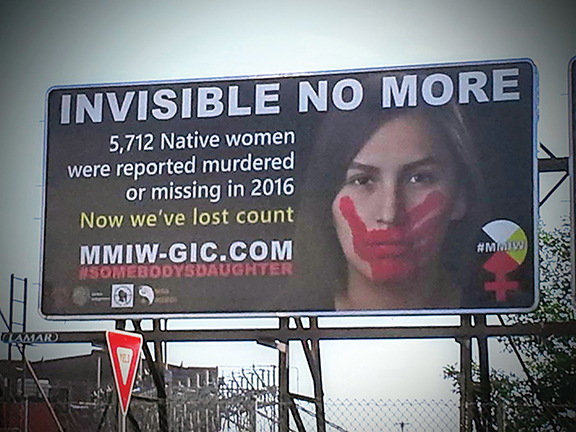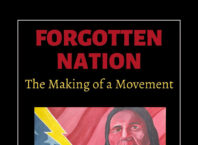By Hannah Broadbent
In November 2019, The Trump Administration launched the Executive Order on Establishing the Task Force on Missing and Murdered American Indians and Alaska Natives. This Task Force is known as Operation Lady Justice.
Elizabeth Carr, Senior Police Advisor for National Indigenous Women’s Resource Center (NIWRC) remembers hearing of the Executive Order for the first time the day after Thanksgiving. She said the announcement felt like a nod towards Native American Heritage Month.
“When it came down we were all kind of surprised, we didn’t know what to think of it because we didn’t know what it pertained to,” Carr said.
According to the order, it is meant to “address the legitimate concerns of American Indian and Alaska Native communities regarding missing and murdered people – particularly missing and murdered indigenous women and girls” by establishing a taskforce at the federal level. It also mentions that the Department of Justice will be responsible for funding the project, which is a budget of 1 million dollars.
Carr said the order reminds her of other bills that are being worked on. Those bills, like the Not Invisible Act, include tribal leader voices, law enforcement from different jurisdictions, tribal advocates and health providers – people that engage with survivors of sexual violence, domestic violence and trafficking. This Executive Order mandates to only engage with federal officials.
In August, almost a year after the inception of the order and almost halfway through the two-year time-stamp on the taskforce, the Missing and Murdered Cold Case Task Force Office opened on July 27, in Bloomington, Minnesota. The ceremony featured Ivanka Trump in a red dress cutting the ribbon. It’s the first of six office locations around the country.
“There was a lot of confusion, thinking the office opening meant they were going to start investigating cases that day,” said the Director of Bureau of Indian Affairs for the Office of Justice Services, Charles Addington.
Addington said the intention was not to confuse anyone, but to announce the office opening and what the office was going to do.
“We have an agent here now, so we are going to start working to build that office out. We are going to start working with the local grassroots groups, the state, the tribal officers and other partners,” Addington said. “We are in the process of doing all those things now.”
Carr says she would love for NIWRC to engage with Operational Lady Justice because her organizations’ mission is to work with communities at the grassroots level and to lift their voice up to the national level and that expertise could prove as critical feedback for the task force. Strong Hearts, in Inver Grove Heights, is the most recent NIWRC office to open.
Carr’s organization is an example of one of many non-profits that is doing work with MMIW, but state governments have also taken responsibility.
Minnesota House Representative Mary Kunesh-Podein, an enrolled member of the Standing Rock Tribe, leads the state task force. “In Minnesota there are all these organizations that are at the grassroots level because their friends and family, their community members, go missing. It’s not just MMIW, it’s also sex trafficking and domestic violence,” Kunesh-Podein said. “I would say this state leads on these kinds of issues, the more people I meet just blow my mind with their dedication and concern for not just the Native community but the community in general.”
She says this community dedication and the work the state task force is doing are more than enough reason to feel passionate about engaging with this federal office.
“We welcome having a department or agency that’s working on something like this because there are more than a handful of cold cases and hundreds more that people could come forward with,” Kunesh-Podein said.
Similar to the report Operation Lady Justice is due to bring forward to the Trump’s office this November, Kunesh-Podein and the state task force for MMIW are working on a comprehensive report that they will bring to legislature in December. She says their report will include proposals and suggestions based on laws, policies, practices and non-practices surrounding missing persons and suspicious death investigations.
Kunesh-Podein it’s been a true collaborative effort, working with commissioners, police departments and DHS and MDH across the state. All these factors, in her opinion, make it one of the most comprehensive reports in the country because of it’s birds-eye-view and the suggestions at the end of the report that they plan to engage in legislation around.
“I know there are states waiting for us to finish our taskforce and replicate it, which would be absolutely fabulous,” Kunesh-Podein said. “Imagine if all of our states were doing the same thing, taking the same data, documenting it in the same way and sharing information across the nation. If every state did that in some capacity, we would have our national study on MMIW right there.”
Kunesh-Podein says their task force communicates with Rep. Tina Smith in Washington for federal level support, but other than that most state task forces run independently of any federal government or funding. She said that funding would be a helpful way for this office to support the local communities they’re embedded in, but communication in any capacity has been lacking for her as well.
“There was never anything sent out to us as a taskforce or at an executive level to say ‘Hey, we are working on this cold case office, we are going to put it in the Twin Cities…etc.,” she said. “There have never been those conversations.”
Carr and Kunesh-Podein have been engaged in the online info sessions the federal task force has held. Both agree they are less than helpful, being plagued with technical difficulties and too much information.
“The opportunity to ask questions or have a conversation was difficult,” Carr said. “A lot of what they did was present vs. engage and have a discussion.”
Addington said that until now, the office just hadn’t been ready to engage with outside organizations yet. Though with the agent that is now in Minneapolis, they plan to begin setting meetings with local grassroots organizations and tribal partners.
“We understand there are a lot of cases there, especially in the urban communities,” Addington said. “It’s going to have to be a collaborative effort. We’re here to assist in cases whenever we can and to work on protocols once those are complete.”
Kunesh-Podein and Carr agree that federal support of any kind, should it be done collaboratively and the way it’s written, could be incredibly effective. They pointed out that right now, there is no clear path forward for an investigation because of jurisdictional challenges and that is where they federal government could really help to determine what those protocols should be.
“If law enforcement in their county doesn’t investigate a case for a family, what is the next level of law enforcement that can get involved?” She asked. “I think it would be really, really important to achieve the goals that are laid out for them. Particularly with the procedures around MMIW.”
Kunesh-Podein said in the end, it is about our communities, the families and friends that are affected, and the community members that are hyperaware of these situations and always looking for resources.
Carr agrees that is more than just the person that is missing or murdered. It’s also about the families, trauma of victims that actually make it home and the trauma communities experience. She said if they could actually start solving cases and even learn to prevent them, then the next focus could be on how to get our communities to a place of healing rather than grieving.
“Unfortunately, that is kind of far off at this point but we keep pushing,” she said. “We take what we can get and we do as much as we can with hopes that we can heal with our community.”
For info on NIWRC, see: niwrc.org
Strong Heart Native Helpline is available at 1-844-762-8483
MMIW information can be found at: https://dps.mn.gov/divisions/ojp/Pages/missing-and-murdered-indigenous-women-task-force.aspx







